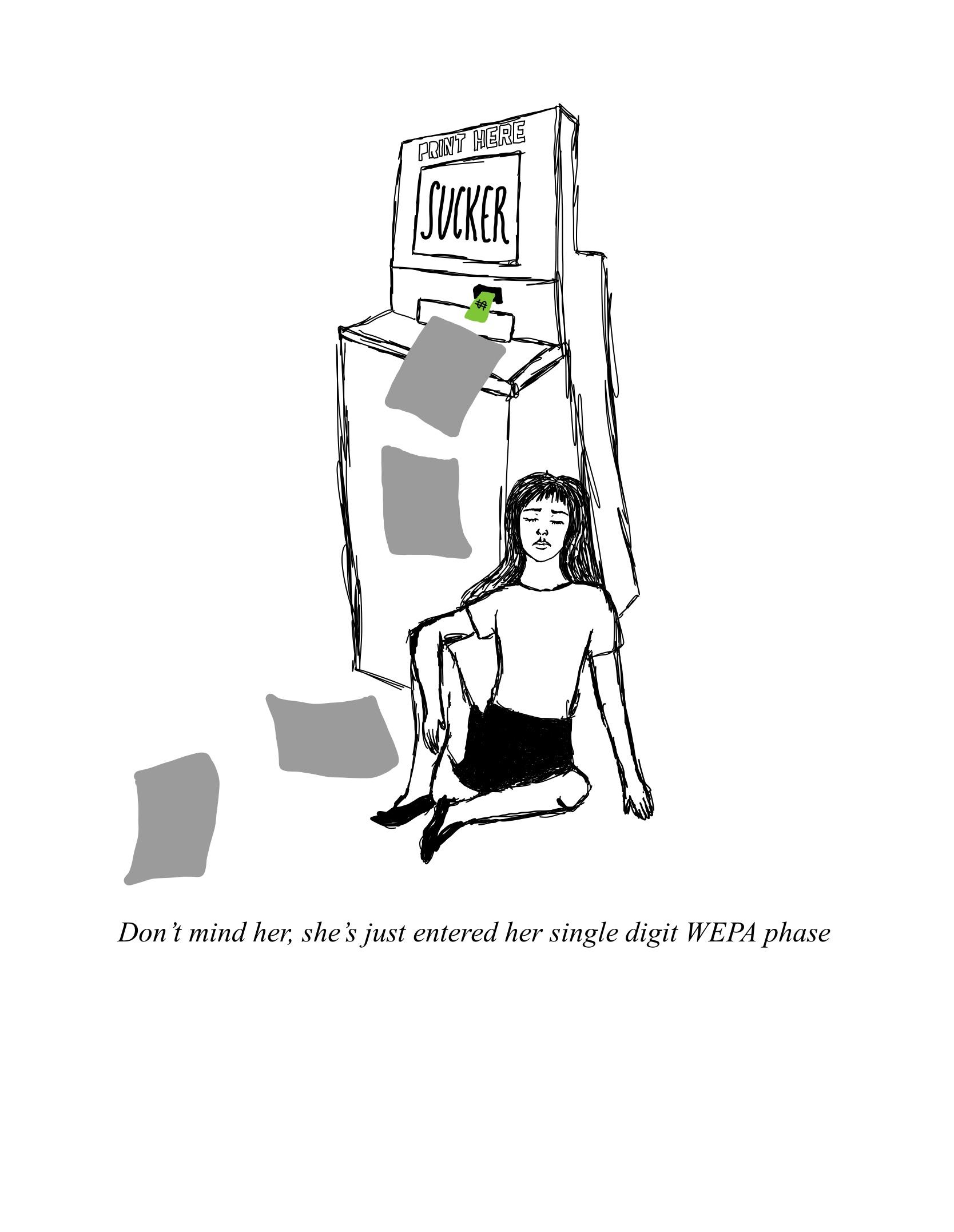When I was child, I used to be afraid of printers and would have a panic attack whenever my parents would print out documents for work. A week ago, I experienced a wholly different sense of unease as I stood in front of one of the printing kiosks in Gelman Library and watched $16 drain from my WEPA balance for a single class.
My professor required that I print 22 copies of a short story that I could have easily emailed to every person in the class and that they could have referred to on computers. Even printing the pages double-sided, I still managed to rack up 143 pages that did not have to be wasted. I currently have $0.20 left of my WEPA balance, and by the time this article is published I will have run out due to several classes that I have taken this year in which computers are not permitted.
This experience is indicative of a broader problem facing students taking classes in the wake of a pandemic that shut down campus last year – professors who refuse to bring their teaching styles into the 21st century. In the wake of the COVID-19 pandemic, professors have had to significantly alter their teaching styles to include online options for their students. For many professors that has meant modernizing the set-up of their classrooms for a hybrid environment so students in person and online can get an equivalent experience. But there have been some holdouts who refuse to fully accept the digital age into their classroom, banning students from using their laptops. It no longer makes sense for professors to prohibit students from using technology in the classroom and the University’s policy should be altered to reflect this transition.

Jenna Baer | Cartoonist
Professors’ enforcement of technology bans vary, but it frequently means students are not allowed to use their personal computers and often requires that students print out pages upon pages of readings and assignments. The professors I have had who do not allow technology usage during class claim it prevents students from getting distracted and that computers create walls rather than conversation. In a COVID-19 world, these fears have been rendered moot as students infected with COVID-19 must join class using computers to be included in lectures and discussions.
Without a near end in sight to our reliance on technology, computers will remain a staple in University classrooms and professors all must shift into this Zoom era. Banning in-person students from using their computers becomes pointless once they can see, or at least hear, their classmates joining discussions from Zoom. Last semester, I had a professor who had a live Zoom link available during our in-person classes and encouraged us to join from our laptops so we could see the questions and comments of students who could not attend the lecture. Although those students were in quarantine, they were not isolated from the conversations we were having in class and in-person students were able to respond to them. Allowing students to use their computers during class does not lead to walls, it ensures that students who have COVID-19 are able to join the conversation.
Another issue with professors banning students from using their computers during class is the cost of printing assignments and readings that could be easily referenced from a computer. Given that laptops already cost students thousands of dollars, we should be able to use them to the fullest extent possible, including during class.
GW granted students a credit of $30 to print using the WEPA printing kiosks around campus in 2019 as part of a broader effort to improve the affordability of on-campus living. GW Information Technology estimates that the $30 credit covers about 427 pages a year per student, taking into account double sided and color printing. If students do not use their entire balance, it does not roll over to the next academic year. This credit is ultimately a finite resource and should be treated as a final resort because once students burn through it, they are forced to start spending their GWorld on printing instead of food. As we are still in the midst of the COVID-19 pandemic and professors continue to rely heavily on computers, students should not be expected to print out all of their assignments. If professors were to allow students to submit assignments via email or Blackboard, students would not have to dip into their GWorld balances.
Students would not be the only ones to benefit from a policy that encourages a reliance on Blackboard as opposed to printing assignments out. GW has made sustainability a greater priority in recent years by pledging to eliminate single-use plastics and divesting its endowment from fossil fuels. Committing to a University-wide policy against professors requiring their students to print would just be another step in the eco-friendly path GW’s headed down.
Students have the ability to report courses that require excessive printing, but this solution does not address the problem at its root. Students should not have to police their professors after their WEPA balance has already been drained. GW must institute a policy that professors not require students to print out all of their assignments and step into the 21st century, in which computers are an essential element in classrooms.
Jenna Baer, a sophomore majoring in creative writing, is an opinions writer.

